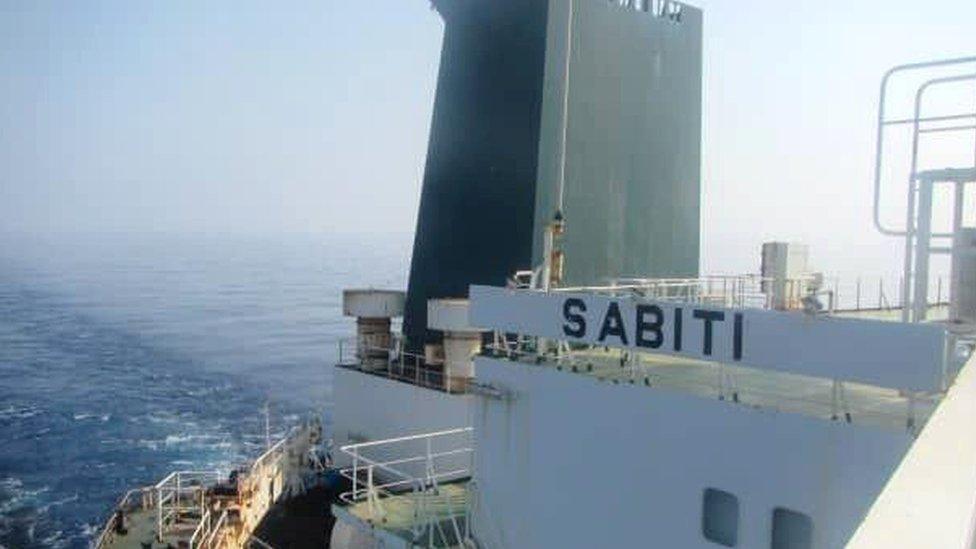Iran oil tanker attacked off Saudi coast, foreign ministry says
- Published

Pictures aboard the Sabiti - allegedly taken on Friday - were published by Iranian state TV
An Iranian-owned oil tanker has been attacked in the Red Sea off the coast of Saudi Arabia, Iran's foreign ministry says.
The ministry said the tanker Sabiti had been hit twice, causing some damage.
Earlier Iran's national oil company (NIOC) said two explosions on the vessel had been caused "likely by missiles".
But it dismissed earlier reports quoting it as saying the missiles were likely to have come from Saudi Arabia.
In recent months "other sabotage acts" had been carried out against Iranian tankers in the Red Sea and these were being investigated, foreign ministry spokesman Abbas Mousavi said.
The incident took place at 04:50 (01:50 GMT) about 95km (60 miles) from the Saudi city of Jeddah, Iran's Mehr news agency said.
Two of the vessel's tanks were struck, it added, causing damage measuring between 0.5m and 1.5m. There were no reports of injuries.
The Sabiti is now sailing towards the Gulf, Mehr said.

The reports have so far only come from Iranian sources. There has been no comment from Saudi officials.
Iranian state TV earlier identified the vessel as the Sinopa, but the NIOC later said it was the Sabiti.
Pictures allegedly taken on Friday aboard the Sabiti have been published by Iranian state TV, showing no visible signs of damage.

Did anything actually happen?
Paul Adams, BBC Diplomatic Correspondent
This story is as clear as mud. It seemed to change. Two different ships have been named - the Sinopa and the Sabiti. We had reports of missiles striking the tanker and then an accusation briefly levelled against Saudi Arabia for committing what was described as an "act of terrorism". That claim seems to have been dropped quite quickly.
And crucially there is no independent evidence at all that the vessel was struck. Pictures were released later in the morning showing nothing untoward. And most crucially both tankers are currently steaming at full speed in their different directions so there is no evidence that either vessel has been impaired in any way.

Publicly available ship tracking records show both ships are currently in the Red Sea. The Sinopa turned its transmitter on earlier this week for the first time in more than 50 days. The Sabiti, meanwhile, turned its tracker on early Friday after nearly 60 days of no transmissions.
Under international regulations, all vessels above a certain tonnage must be fitted with the trackers, known as automatic identification systems (AIS). But ships are not required to have their AIS turned on all the time.
Allow X content?
This article contains content provided by X. We ask for your permission before anything is loaded, as they may be using cookies and other technologies. You may want to read X’s cookie policy, external and privacy policy, external before accepting. To view this content choose ‘accept and continue’.
A source at maritime analytics firm Windward told the BBC it was common for Iranian tankers to turn off AIS to avoid detection - often to evade international sanctions or harassment from Saudi Arabia.
Because of safety regulations, vessels must have their AIS switched on when they are close to the Suez Canal. The Windward source said Sabiti was behaving unusually because, when going through the canal, it only switches on its AIS when rules require - but in this instance, the AIS had been turned on hundreds of miles from the Suez after being "dark" for two months.
Michelle Bockmann, an analyst at shipping newspaper Lloyds List, told the BBC that the tanker - whichever one it was - was "probably" carrying oil to Syria.
How sanctions affect Iran... in five objects
"That really is, along with China, the only market there is for Iranian crude now since the US tightened sanctions in May," said Ms Bockmann. "We're seeing geopolitics playing out within the global shipping and tanker markets, and this is just an extension of the instability that we're seeing in the region."
The latest incident came amid heightened tension between Iran and Saudi Arabia in recent months.
Last month, 18 drones and seven cruise missiles hit a major oil field and processing facility in Saudi Arabia, which blamed Iran for the attack.
And US officials said Iran was responsible for attacks on two oil tankers in the Gulf in June and July, as well as attacks on another four tankers in May.
Iran denied involvement in all the incidents.